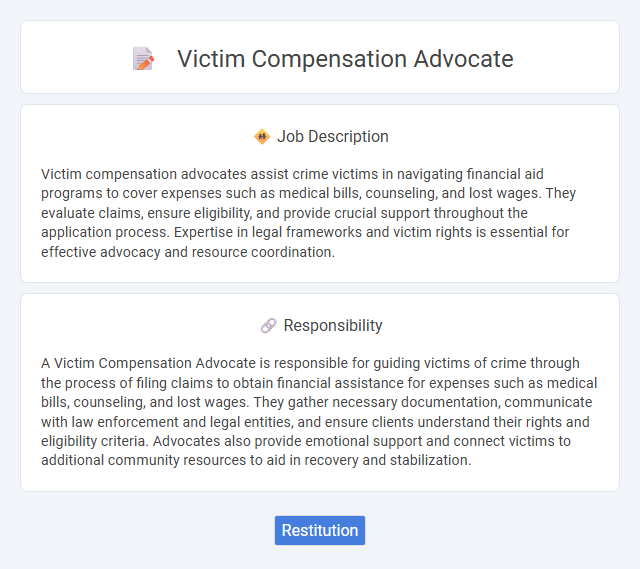
Victim compensation advocates assist crime victims in navigating financial aid programs to cover expenses such as medical bills, counseling, and lost wages. They evaluate claims, ensure eligibility, and provide crucial support throughout the application process. Expertise in legal frameworks and victim rights is essential for effective advocacy and resource coordination.
Individuals who are empathetic, patient, and skilled in communication are likely to be well-suited for a role as a victim compensation advocate. Those who can manage high-stress situations and maintain emotional resilience might find greater success and satisfaction in this position. Candidates struggling with emotional regulation or lacking compassion may encounter challenges in effectively supporting victims through complex compensation processes.
Qualification
A victim compensation advocate must possess a deep understanding of legal and social services systems, typically requiring a bachelor's degree in social work, criminal justice, or a related field. Strong communication and interpersonal skills are essential for effectively assisting victims in navigating the compensation process and providing emotional support. Experience with crisis intervention, case management, and knowledge of local victim compensation laws significantly enhance an advocate's ability to deliver comprehensive assistance.
Responsibility
A Victim Compensation Advocate is responsible for guiding victims of crime through the process of filing claims to obtain financial assistance for expenses such as medical bills, counseling, and lost wages. They gather necessary documentation, communicate with law enforcement and legal entities, and ensure clients understand their rights and eligibility criteria. Advocates also provide emotional support and connect victims to additional community resources to aid in recovery and stabilization.
Benefit
Victim compensation advocates likely provide crucial support to crime victims by assisting them in accessing financial benefits intended to cover medical expenses, lost wages, and counseling services. Their guidance probably increases the probability that victims will successfully navigate complex application processes and receive timely compensation. Advocates may also contribute to improving the victims' overall recovery experience by ensuring they are informed about their rights and available resources.
Challenge
Victim compensation advocates likely face the challenge of navigating complex legal and bureaucratic systems to secure financial aid for those affected by crime. They probably encounter emotional stress while supporting individuals coping with trauma, requiring both empathy and resilience. Managing limited resources and tight deadlines might also complicate efforts to provide timely assistance.
Career Advancement
Victim compensation advocates play a critical role in supporting individuals affected by crime, facilitating access to financial aid and counseling services. Career advancement opportunities often include positions such as senior advocate, program coordinator, or victim services manager, which require expanded skills in case management, legal knowledge, and grant writing. Professionals in this field can also pursue certifications like Certified Victim Advocate (CVA) to enhance their credentials and increase prospects for leadership roles within government agencies or nonprofit organizations.
Key Terms
Restitution
Victim compensation advocates specialize in securing restitution for crime victims by navigating legal processes and coordinating with law enforcement, courts, and financial institutions. They assess damage claims, document losses, and facilitate timely payment of compensation to cover medical expenses, lost wages, and counseling services. Their expertise ensures victims receive rightful financial support, promoting recovery and justice within the restitution framework.
 kuljobs.com
kuljobs.com